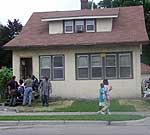By Brandt Williams
Minnesota Public Radio
August 27, 2002
The atmosphere remains calm in the north Minneapolis neighborhood which last week exploded in a violent melee, after a young boy was injured during a police raid. As neighbors and city officials try to make sense of what happened, some are asking why the house - suspected by police and neighbors as a drug house - is still occupied.
| |
|
|
|
||
Deb Wagner lives a block away from the house at the hub of last week's disturbance. She is also a real estate agent who specializes in finding homes for people in north Minneapolis. So she makes a point to pay close attention to the housing stock in her neighborhood. She says certain indicators point to a problem property.
"Typically there's a lot of activity in the front yards of these places, so the ground cover is pretty much not there and you have bare dirt front yards," Wagner says.
The house at the corner of 26th and Knox Ave. North has no grass to speak of in its tiny front lawn. The door to the front porch is nearly always open, and on many days groups of five to 10 people hang out on the front steps. Three city trash bins sit across the sidewalk, and judging by the litter which lays next to them - are not often used by passersby who toss their food containers on the ground.
"The people typically living in these houses that are involved in this kind of activity don't treat the house with much respect, don't have a sense of pride in where they're living - and the houses reflect that," says Wagner.
Members of the family who live in the house deny there is any drug dealing going on there. Some say they try to chase away drug dealers who gather on the corner near their house. The property owner, who lives in Elk River, has said he believes what his tenants are telling him.
|
"The people typically living in these houses that are involved in this kind of activity don't treat the house with much respect, don't have a sense of pride in where they're living - and the houses reflect that."
- Deb Wagner, real estate agent in north Minneapolis |
However, records show the police have been called there 13 times this year, and 63 times over the last five years, for various reasons including narcotics. City officials say the situation may not call for drastic action just yet.
"It probably hasn't met the criteria at this point," says JoAnn Velde, deputy director of housing inspection services for the city of Minneapolis. "It would take three drug situations for us to move forward with a revocation."
Velde says it takes three qualifying incidents in a year's time to initiate rental license revocation. A qualifying incident is a situation where police find reasonable evidence to show that illegal activity, like drug dealing, prostitution, loud parties or gambling have occurred on the premises. Complaints for owner-occupied property are handled through the county attorney's office.
Velde says after an address has been logged as the site of criminal activity, the police Community Crime Prevention SAFE Department contacts the owner.
"The SAFE unit sends out over 1,000 of those letters," Velde says. "They don't send out as many second letters and they don't send out very many third letters, because most owners do respond."
Velde says rental license revocations are not common in Minneapolis - only about five happen per year. She says licenses can be reinstated after a landlord works out a management plan addressing how they will correct the problems with their properties.
Landlords can also be sanctioned for having property that contains dirt yards, litter, broken doors and screens, or that are the subject of an excessive number of 911 calls.
Ward 3 City Council Member Joe Biernat chairs the city's committee which holds the power to revoke business and residential licenses. He says if residents want to help speed up the process of quieting a problem property, they should call 911.
"That is more beneficial, because statistically we begin to develop a log and better documentation on that problem property," Biernat says. "Numerous times people call here and only here, so that when I try to address the property and I try to get the license revoked, we pull up the 911 log and there aren't any calls of complaint against the property."
Biernat says the house at 26th and Knox is a problem house, but not as bad as some residences which have been the site of 13 calls to 911 per week, rather than over the course of several months.
More from MPR
